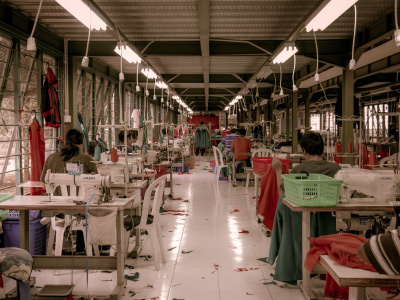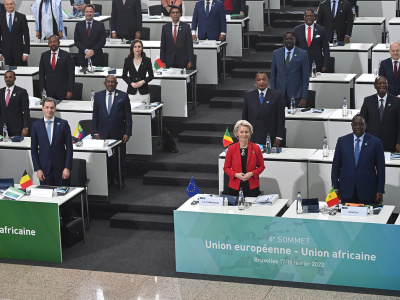
Four ideas to give Africa its place in the EU Global Strategy
What's on this page
In less than three months, Europe will release its first-ever Global Strategy on Foreign and Security Policy (EUGS). The EUGS aims at creating “a stronger and more effective EU foreign policy,” in words of the HR/VP Federica Mogherini. But can this new policy document bring more unity to the EU External Action, especially in relation to Africa? Ahead of the AU-EU College-to-College meeting taking place on 7 of April 2016, we present some learnings from our last Paris conference on Europe and Africa’s strategic approach on how Africa will have to feature in the EU Global Strategy (#EUGlobalStrategy).
1. The #EUGlobalStrategy: balance short and longer term priorities
Short-term security and migration challenges focused much of the attention at the Paris conference – and will likely continue to do so. Europeans listed the fight against human trafficking, migrant smuggling and the strengthening of border management as top priorities while realising that most of the African migrants and refugees are in Africa itself. As shown during the Valetta summit, Africans would rather focus the dialogue on long-term solutions like improving migration’s legal channels and resolving youth employment issues. Disagreements over strategies to cope with these challenges can hinder the effectiveness of EU-Africa cooperation. This echoes recent findings by the European Court of Auditors (ECA): reluctance by partner countries to engage with the EU in the migration domain is partly explained by the “perception that some actions were primarily intended for the EU’s benefit.” With 19 of the 32 Common Security and Defense Policy (CSDP) operations being in relation to Africa and the EU being a major funder of the African Peace and Security Architecture (APSA), the EU has a serious track record in Pan-African security matters. Despite limited African appetite for direct European military operations on the African soil, cooperation in the area of security and defence is still recognised as of mutual interest for both continents. The other highly salient issue in the security cooperation area is the fight against a variety of terrorist groups in North Africa, West Africa, the Sahel and the Horn of Africa (Al Shabab, Boko Haram, AQIM, Islamic State, etc.). In parallel, the EU is working on longer terms policy processes: a new European Consensus on Development is likely to emerge, aligned with the Sustainable Development Goals (SDGs), and the new European Neighbourhood Policy (ENP) will be implemented in North Africa. By 2020, the post-Cotonou framework would have to be agreed. The coming years will, therefore, be crucial in redesigning the framework of cooperation between Europe and Africa.2. Squeeze space for EU contradictions towards Africa
On top of the difficulty in handling at times diverging European and African interests, the EUGS faces a challenge at home: reconciling its own European priorities in Africa. As put by an ETTG study, “the EUGS should be an umbrella document for all EU external action – including development, trade, humanitarian aid and climate action.” In other words, the EU Global Strategy has to avoid contradictions with the mindset and the joint commitments set out in the current Joint Africa-Europe Strategy. At the same time, the EUGS is an opportunity for the EU to set the tone of its interests one year ahead of the next EU-Africa summit, even if it leads to heated debates with its African partners. For instance, we heard in Paris that the EUGS may prioritise certain African regions (North Africa, Sahel, the Horn and with an unclear level of priority, Central Africa) over others (Southern Africa).“The EUGS is an opportunity for the EU to set the tone of its interests one year ahead of the next EU-Africa summitIf this choice is confirmed, it needs to be explained, especially to African partners used to the EU’s rhetoric of treating Africa as one. Geographical differences should promote and not hinder cross-border programmes in the Sahel and North Africa which are crucial in the fight against terrorism and human trafficking. The debate on the EU’s geographical priorities in Africa may also be useful input to those who are busy with the design of scenarios to rethink the Cotonou Partnership Agreement, ending in 2020.
3. Pave the way to the 2017 Africa-EU summit
In 2017, the fifth EU-Africa Summit will be held in Africa to adopt a new Roadmap. There are several long-term trends that should be tackled as early as possible through regular and in-depth dialogue during and between EU-Africa summits. First, African interlocutors and African institutions (as well as the regional heavyweights of the continent) will be more self-centred and more focused on their own interests. Second, Africa’s demographic trends are likely to lead to more challenges for sustainable development and perhaps more migration flows within and from Africa. Third, it is likely that Europeans, because of the numerous crises they face internally, will be bolder in asserting their security, economic and trade interests. However, further tensions may arise if both sides do not leave the donor-recipient relationship to the past: Europeans will have to genuinely listen to those supposed to benefit from aid and co-create with them while African governments will have to become serious about domestic resource mobilisation.4. Modernise language and talk about “Africa-Europe” or “Europe-Africa” relations
The institutional framework of traditional EU-Africa relations has become insufficient. The trends identified above point to the limitations of classic institutional cooperation between the EU and the AU. “Europe-Africa” or “Africa-Europe relations” is the new wording to be used in the EU Global Strategy that reflects new realities: societies, people, (physical as well as digital) capital flows and markets will determine the relations between the two continents, even beyond bureaucracies. Public policies will be strongly influenced by non-state actors like migration but also the organised crime and terrorism. Harnessing and enabling these modern forms of exchanges is an enormous challenge for European and African governments and societies as well as for the EU and the AU.“Europe-Africa” or “Africa-Europe relations” is the new wording to be used in the EU Global StrategyOf course, the Global Strategy and the College-to-College meeting will not solve every security issue nor will it address every inconsistency or limitation in EU or AU foreign, trade and development policy. Yet candid, humble and renewed recognition of linkages between the past and future commitments as well as of shifting roles of institutions, markets and societies would pave the way to revived trust and willingness to work better together. The College to College will hopefully come up with a convincing update on the width and depth of EU-AU relations, to reassure those who think this partnership is neglected. By the next EU-Africa summit in 2017, three political signals could be jointly prepared by both sides: a shift towards the “Africa-Europe” language acknowledging the role of societies and markets; more policy dovetailing enabling a sense of unity among various EU frameworks applicable to Africa and some concrete signs from the African side that efforts are made on domestic resource mobilisation. The EU Global Strategy, by refreshing its language and underlining the European unity imperative, would be a first step in the right direction to revitalised Europe-Africa relations. The conference ‘Europe & Africa: a strategic approach’, which took place in Paris on the 17th and 18th of February 2016, was jointly organised by ECDPM, the European Institute for Security Studies (EUISS), Istituto Affari Internazionali (IAI) and Institut Français de Relations Internationales (IFRI). For more details on the conference, please visit our events page. The views expressed here are those of the authors and not necessarily those of ECDPM.





